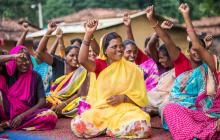Implementing Women’s Group Programs at Scale: Implications for Costs and Cost-effectiveness
The development community is increasingly recognizing the need to integrate robust implementation research with impact evaluations to apply their lessons to decisions about scaling up pilot interventions. Research also has demonstrated the implications of program scale-up for implementation quality and program impacts. For example, studies have shown that many successful pilot interventions fail to produce similar impacts when scaled up, owing to multiple reasons. The decision to invest in a program, however, is guided by both program effectiveness as well as the cost of producing those effects, making it imperative to understand the implications of program scale for costs.
This webinar will include two studies that demonstrate costs of scaled-up livelihoods and health interventions, delivered through women’s group programming. The session will specifically explore economies of scale and cost-effectiveness of a Self-Help Group program in India, and the scale-up costs and outcomes of a participatory learning and action cycle with women's groups across multiple countries.
Photo courtesy Gates Archive
Moderator
Thomas de Hoop, Program Area Lead, Gender and Social Protection and Principal Economic Researcher, AIR
Speakers
Dr. Hassan Haghparast-Bidgoli, Principal Research Fellow, UCL Centre for Global Health Economics
Dr. Garima Siwach, Senior Economic Researcher, AIR
Dr. Fred Matovu, Senior Lecturer of Health Economics, School of Economics, Makerere University
Jacqueline Naggayi Mukisa, Monitoring & Evalulation and Knowledge Management Manager, PROFIRA


